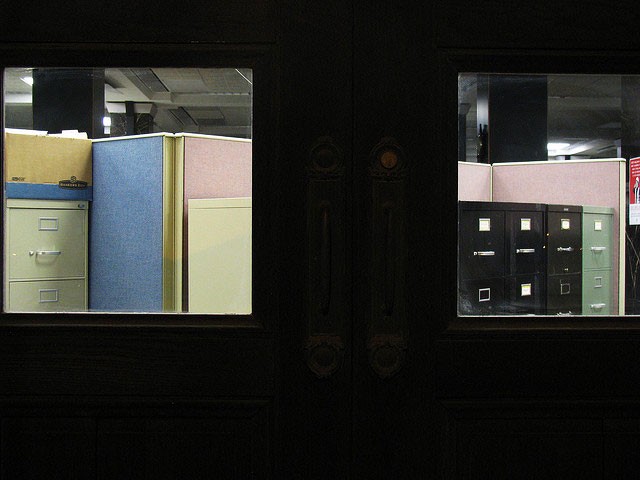What I Learned Working The Graveyard Shift
by Jordan G. Teicher

It’s 2:15 a.m. and I’m eating breakfast — or is it late dinner? — I’m not sure what to call meals at these ungainly times. In a few more minutes I’ll be out the door and in a cab, zipping along dark, empty streets. Whoever said the city never sleeps hasn’t made this particular drive downtown at this particular hour.
Living in Manhattan these past few years, I know there are honking horns, neon lights and wild crowds somewhere, even at this hour. But the city that passes my window is quiet, lit only in pockets, illuminating the solitary figures that populate it like characters in an Edward Hopper painting. I might find it beautiful, if it weren’t the routine landscape of my work commute these past several months.
By 3 a.m., I’m at my desk, writing the television news that will greet New Yorkers preparing for their own commutes in the hours to come. It’s not always my shift. As a freelance writer on a variable schedule, there are days I start work in the afternoon and end at midnight, others when I come in at 7 a.m., like most New Yorkers.
But those days have gotten to be few and far between. Recently, I had become a night guy, one of the go-tos for the 3 and 4 a.m. shifts. That made me part of an unfortunate demographic, the estimated 20 percent of the workforce in developed countries working the overnight shift, a population prone to sleep deprivation, weakened immune systems, and a host of possible medical conditions from high blood pressure to diabetes, even cancer.
As bad as that sounds, for some people I know, the night shift worked. My colleagues with children relished the ability to pick their kids up from school in the afternoon. My taxi driver told me he liked driving at night. No traffic. Fewer hazards. Less drama.
He had a point. Weekend nights at the sparsely populated station, I’d find an almost meditative rhythm with the producer on duty, the two of us working in near-silence for hours, a stark and refreshing contrast to the mania of mid-day.
Months after taking the position, my first “real” job in journalism since graduating from college, I tried telling myself that those benefits weren’t just drops in the bucket, but strong arguments for liking the job and sticking with it.
But I couldn’t ignore what was really going on: A war against my body’s natural impulses, whose battles I was regularly losing. I bought melatonin pills in hopes of falling asleep at 7 every night. That didn’t work. Even after shifts on a near-appropriate amount of sleep, I found myself emerging bleary-eyed into the bright afternoon, unable to fathom staying up long enough to socialize, no less look for other jobs. Turns out that the body doesn’t like when you mess with its biological clock. It wants to sleep when it’s dark.
When I did manage to drag myself out into the world, I was, I admit, irritable and short-tempered. Heaven help the individuals who, occasionally and unwittingly, disrupted my hard-won sleep. Sometimes I just couldn’t help lashing out, undeservedly, at friends and family. Generously, instead of telling me to go screw myself, they politely suggested I look for another gig.
But when I considered leaving the station cold turkey, it felt like such an entitled, Gen-Y thing to do. I thought of all the other night workers in other fields who had it worse than I, the ones who perform physical labor, or who got paid less than I did, or who don’t have a car to take them there on the company dime. How could I, at 22 years old, working in relatively cushy conditions, say it was too hard?
The truth, I know, is that we need people to do these jobs: to fight the late-night fires, to tend the ill, fly the red-eye flights, and, yes, write the news. And in an economy where any full-time job is hard to come by, a lot of people have no choice but to take what they can get. But did that include me?
One of the good things about having such an extreme schedule was that it forced me, more perhaps than my friends doing 9-to-5, to consider what my work really meant to me. Were the pleasures of normal life — resting and eating and socializing with the majority of humanity — more important than the satisfaction of employment in the field I’d been trained to enter? Was my passion worth the pain? Was it really even my passion?
I knew I’d have to leave that job to really find out. And so one day last month, I did. Today, I’m adjusting to a healthier, albeit less lucrative, existence. My biological clock has reset, and in many ways life feels normal again, even as it remains in flux.
But my outlook has changed. Now, when I get into bed, my thoughts turn to the people all over the country, just awakening as I close my eyes. I feel for them. I also admire them, for enduring tough conditions to keep our 24/7 world functioning.
Days after my final late shift, I am only beginning to answer those essential questions about work and life. Primarily, I feel fear about what the future holds. But I also feel gratitude — for the simple joy of waking to the morning light.
Jordan G. Teicher is a journalist living in New York City. He has written for NPR, Slate and the New York Daily News. Photo: Alex Ford
Support The Billfold
The Billfold continues to exist thanks to support from our readers. Help us continue to do our work by making a monthly pledge on Patreon or a one-time-only contribution through PayPal.
Comments